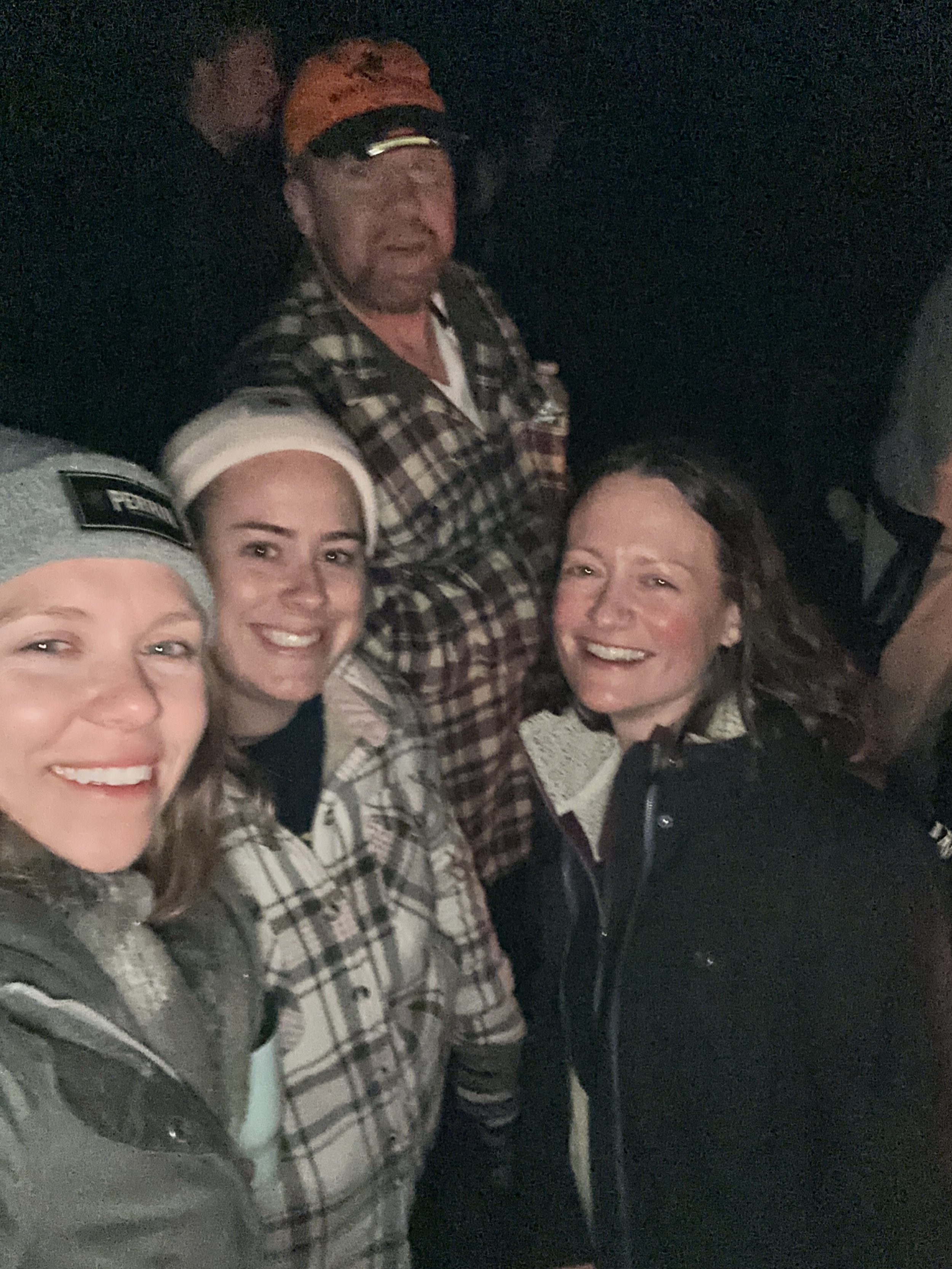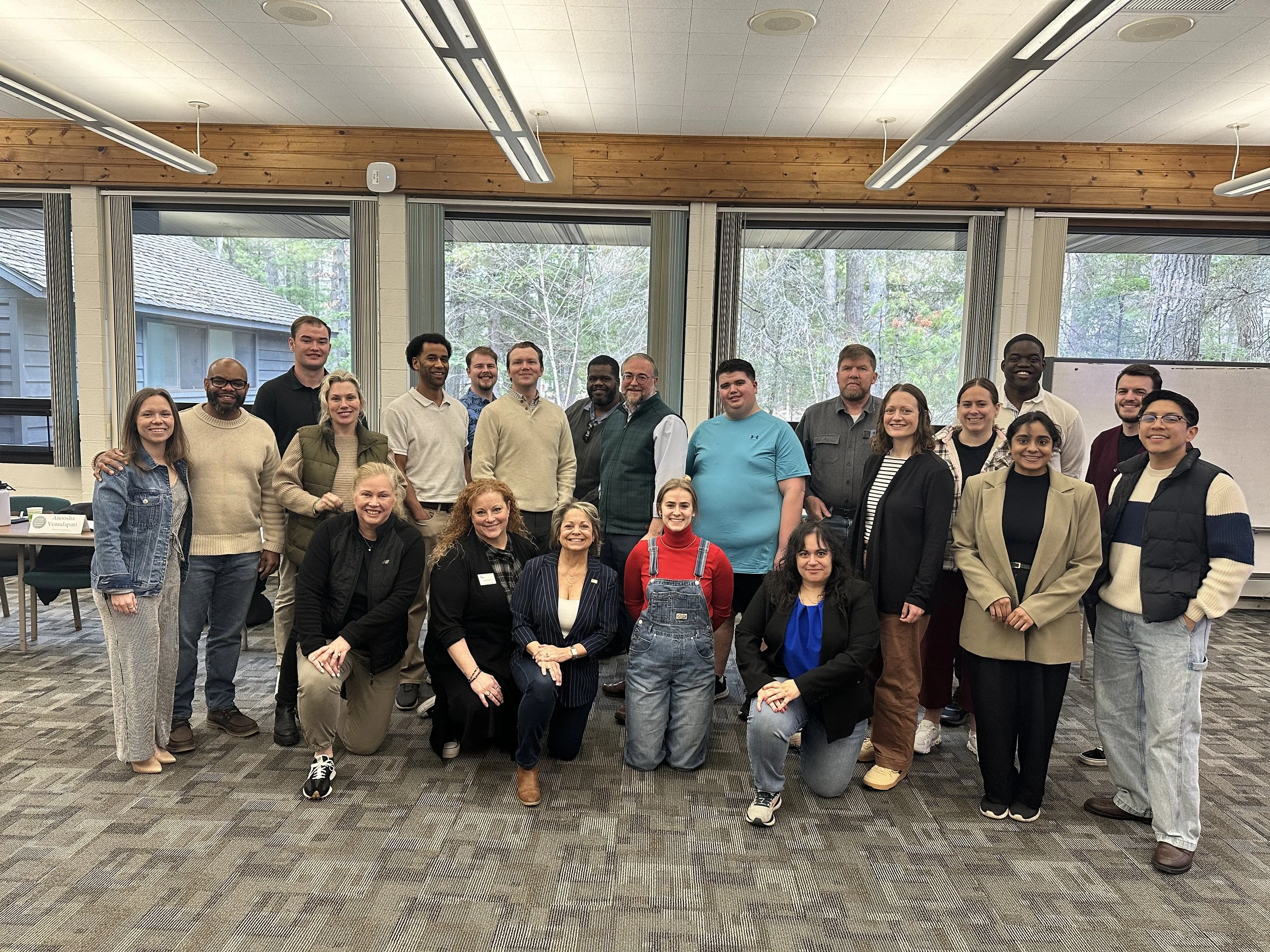Revenue, Rural Roads, and a Bonfire Full of Opinions
MPLP Session III took us up north to the Ralph A. MacMullan Conference Center in Roscommon, and it had all the makings of a memorable weekend—copious trees, firepits, hearty conversations, and a campaign speech given in a room full of aspiring electeds.
This time around, I roomed with Logan Vorce, who works for Michigan Climate Action Votes. She’s smart, driven, and incredibly well-versed in how to navigate government systems.
Forget to grab a photo with her! Here’s a photo of Logan and Rudy at the camp fire though.
One Wednesday prior, Logan gave me a mini masterclass on how to effectively reach your legislator—complete with a few great websites for identifying your local representatives. We were in Lansing for an optional MPLP fundraiser celebrating the 2024 class, with David Wasserman as the keynote speaker. David and I go way back… all the way to last fall, when I first heard him speak at the Grand Rapids Economic Club. He’s one of those data-driven analytic minds, but with a healthy dose of charm and wit.
We had lunch that day, and I learned he gave over 200 talks last year on the speaker circuit. Though his work covers national trends, his insight feels incredibly local and relatable. He told me that as a kid, he used to go to the library and read the resource books—since you weren’t allowed to check those out. (Yes, that kind of dedication starts early!) Over smoked brisket and sides, he shared all the ins and outs of life as a political analyst for The Cook Political Report. The knowledge he can rattle off without notes is fascinating. Oh—and he has a Carnegie Fellowship, which is a pretty big deal. (Fun fact: Dr. Matt Grossmann, our MPLP director, earned one this year as well!)
What really put him on the map was his now-famous Cracker Barrel vs. Whole Foods political analysis. If you haven’t heard it yet, I highly recommend looking it up—or better yet, inviting him to speak at your organization. It’s that good.
It really got me thinking: I’d love to get to that level in research someday. It’s inspiring to see how many resources exist for people to pursue their passions and still build a thriving career.
That evening, I joined the VIP reception, (thanks Linda!) where I got to see my pal David again—and we snapped a fun photo together. We cute!
Photo Credit: Domagalski Photography
To learn more about The Cook Political Report, check it out here.
OK back to the third session!
We kicked things off Friday evening with a presentation from John LaMacchia of the Michigan Municipal League on Michigan’s local government structure. One topic that really stuck with me was revenue sharing—a policy that always sounds so good in theory (redistributing tax dollars more evenly across the state) but feels a bit tricky in practice. Especially when you're from a township like Cannon, where a large portion of our tax dollars don’t actually stay local. That tension between equity and autonomy is real, and it’s a conversation worth continuing.
After the session, we headed out to the hospitality bonfire— the energy was warm and the conversations were sparky (in a good way). I overheard someone passionately referencing Jesus flipping tables and, for a second, thought, uh oh. But it turned out to be a lively political debate, not a brawl. That’s the beauty of this group—we’re not afraid to speak our minds, and we genuinely listen to each other. The dialogue is real. And the mutual respect is even more refreshing than the cool Up North air.
Saturday morning we dove into a Rural Issues Panel that really hit home. From ballot access to infrastructure challenges, a lot of the concerns raised were incredibly relevant to Cannon Township. One major takeaway: when state policies are applied uniformly across urban and rural areas, townships often carry a disproportionate burden—like the cost of extended early voting. It’s well-intentioned legislation with expensive consequences, and it reminded me again how vital it is to advocate for local nuance in state policy.
I really connected with Kim Morley a Ross Common County Commissioner. She had spunk and high energy!
Unfortunately, our hike at Hartwick Pines had to be canceled due to an ice storm a week prior, but we still got outside, walked the property, and did a bit of natural ID work—which felt grounding and gave us space for more good convos.
Pictures is the Lorax of the North, DNR’s Park Interpreter, Craig Kasmer
The afternoon brought a session I found particularly meaningful: Tribal Government with Aaron Payment, former chair of the Sault Ste. Marie Tribe of Chippewa Indians and a longtime MPLP alum. He walked us through the unique legal status of tribal governments, particularly their sovereignty, which is recognized through a series of treaties signed with the federal government—including the Treaty of Washington (1836). This treaty ceded large portions of Michigan land to the U.S. but also affirmed the tribe’s rights to hunting, fishing, and self-governance. I left the session with a deeper understanding of representation—and how vital it is to include tribal voices in Michigan’s political landscape.
We wrapped the weekend with a campaign plan check-in, where—surprise!—I was selected to give my speech. I decided to “run” for Drain Commissioner, and was swiftly informed by Rudy that I was the first MPLP fellow in the program’s history to choose that office. What can I say? I like a challenge—and clear ditches. My delivery was okay, but I’m already thinking about how to tighten it up and deliver it with more punch next time.
Three sessions in, I feel like I’ve hit a groove. I know the rhythm of the weekends, I’m building real friendships, and I’m learning more than I ever expected. From revenue sharing to rural advocacy, tribal sovereignty to bonfire debates—Roscommon reminded me that the deeper you go in service, the more perspectives you have to hold.
And if you can hold them all with kindness and curiosity? That’s where real leadership begins.








